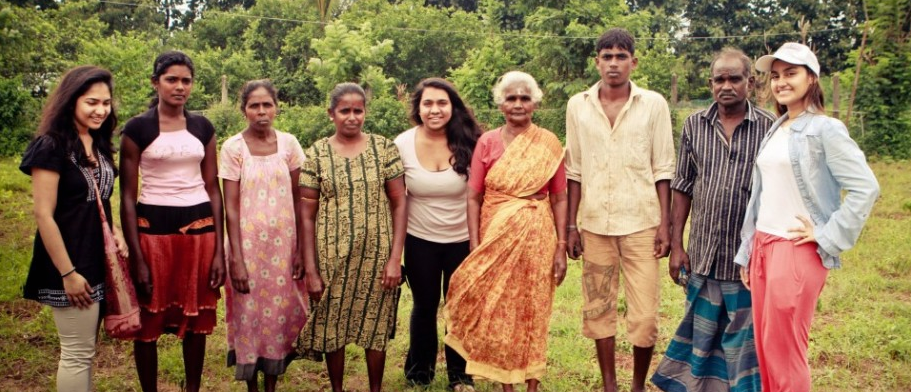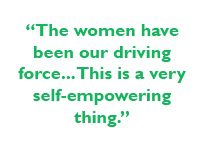 Sri Lanka’s Civil War left behind more than 90,000 war widows, and the region suffers from high unemployment rates, due primarily to an information gap that exists between job seekers and employers.
Sri Lanka’s Civil War left behind more than 90,000 war widows, and the region suffers from high unemployment rates, due primarily to an information gap that exists between job seekers and employers.
With support from several SAI grants, Ishani Premaratne, Harvard College ‘15, along with her twin sister, Inesha Premaratne, Harvard College ‘15, and their Harvard classmate Casimira Karunaratne, Harvard College ’15, formed GrowLanka to address this gap and empower women through employment.
In order to reduce high unemployment rates, GrowLanka developed a mobile job alert system that gives employers a direct line of access to job seekers, primarily women.
SAI talked to Ishani, who was in Sri Lanka during the winter academic session, about the organization and its future:
SAI: What problem were you trying to address with GrowLanka?
Ishani: GrowLanka started when my twin sister, Inesha and I were taking a social entrepreneurship class our freshmen year, which is also the year that the Harvard i-Lab was opening. We both came in knowing that we were interested in Sri Lanka, knowing that the civil war had recently ended in 2009. We knew we wanted to do something to help but didn’t necessarily know how or how to approach that.
So, we started looking specifically to the population of war widows in Sri Lanka, which is particularly high in the region. It was post-civil war, and a lot of these women had to support their children. They also had to work, which not a lot of them had been doing. So we identified that as our main problem area: How do we connect these women to a source of employment?
Ultimately, we developed GrowLanka, which is an SMS system that connects employers with these war widows directly, and basically gives them an alert when there’s a new job opportunity available.
SAI: Did you have any technology experience? How did you come to the idea of a text-based system?
IP: I didn’t have any technical background in high school, but I have an interest in the sciences (I am a pre-med). And my sister [Inesha Premaratne, Harvard College ‘15] is interested in economics and government. During a freshman year course, we were also able to connect with a lot of tech entrepreneurs who could give us advice, and we ultimately ended up partnering with a developer in Sri Lanka.
We wanted to keep a lot of the tech stuff in the country. We had to learn a lot of it from the ground- up. So, we designed the system and talked to developers, with an aim to go back every summer break and every winter break to field-test it.
SAI: Were there any models that existed before for this kind of system, or is this a new idea?
IP: For us, in this context, it was a new idea, but as with most things, there’s no need to reinvent the wheel completely. We knew that we wanted to capitalize on mobile technology, because mobile penetration was really high, at about 85%. Based on my travel experiences, I realized that even when there’s no running water, there are cellphones. We knew that’s where we would start, and where we did a lot of our research.
SAI: When you were there on the ground, what were you doing?
IP: My sister and I are Sri Lankan, and we have been going there since we were small, but when the war ended, that was the first time the northern part of the country was opened up and people were allowed to go there. So, even my parents have never been there, because the war lasted their entire childhood. So for us, it was a really different experience to see a part of the country that we thought we knew really well, but hadn’t really seen a lot of.
Our first trips were focused on trying to figure out what we can do. We wanted to do something but didn’t want to implant ourselves in a situation that didn’t need us. We decided organically that the best way that we can help is by helping these women get jobs, because so many other things would come from that.
SAI: What has the feedback and response been from the women themselves? What do you hear from them about this service?
IP: The women have been our driving force. They are the reason that we do this. Going back and talking to them after the fact has been really gratifying because a lot of them would say things like, “I felt completely lost after the war ended, I lost my husband, I lost my land. But now, not only do I feel I have the ability to support my children but I am also working for the first time.”
This is a very self-empowering thing. It [the Sri Lankan war] is also an ethnic conflict, you have to remember, so we see it [GrowLanka] as important in building trust on a bigger scale and towards that reconciliation process.
SAI: In terms of numbers, what kind of progress have you seen? Have there been any setbacks?
IP: One challenge is that people think that there are these foreigners coming in– there’s that bridge that we had to cross. We didn’t want to impose ourselves on anybody. But since we started, we started with 0 and now we have 400+ subscribers as of 2013 and now we are over 550.
Our hope is that we continue to add people into the system and connect as many women to jobs as possible. A lot of our women work in factories because the garment industry is so strong, but we were also hesitant because the garment industry can have a bad reputation in some places, and we didn’t want these women to be victimized in a different context. So we were very intent on finding companies that have specific programs for women workers with a safe environment.
SAI: After you vetted the companies, how did you connect with the women? Is there a network of women who are looking for jobs?
IP: In the beginning it was on foot. But later, it’s not surprising that word travels pretty fast among women, and a lot of people would just text each other to subscribe to the system. We also used fliers and traditional means of spreading the word.
SAI: You mentioned previously that you have a partnership with the government – can you expand on that?
IP: That’s been really exciting for us. It’s a partnership with the youth ministry of the Sri Lankan government. Although we have been helped by the resources at Harvard, it’s also difficult to run an expanding system and to keep all the employers and the subscribers in the loop without bigger scale support.
So, we started reaching out to different government officials and on some of our trips we would spend time in Colombo to meet with people and share what we have done. After we did a pilot, we had some results to show that this has been working, and ask them if they would be interested in jumping on board with us. And the Youth Ministry said that they had been hoping to do something like this, but didn’t know how to approach it.
SAI: What is the Youth Ministry’s role in the project?
IP: They are basically helping us with expansion. In the country, they run youth programs, education, and a lot of different things for just the youth of the country, and they know that a lot of these people who are seeking jobs are women and are young. Also, these mothers want to provide for their children.
The whole country is interested in supporting growth in the northern region, so they [the Youth Ministry] are helping us with expansion, and giving us the governmental support, which is really important.
SAI: Do you think this concept is scalable and adaptable to other countries, either in South Asia or other developing countries?
IP: One of the reasons we sought out the Youth Ministry partnership was because we wanted to make it a bigger initiative. As students, we couldn’t do that by ourselves.
As far as making it adaptable to other contexts – definitely. Like I said, we looked at other models when we were looking to develop the system for ourselves. We know the model has worked in other contexts. We know what is unique and specific about this situation is that it’s a post-conflict environment.
SAI: Is your idea that it can be self-sustainable in the future?
IP: In an ideal world, the employers would begin to know the region so well that they wouldn’t need or depend on our system. But now, certainly, for at least the foreseeable future, the government will help us keep it sustainable and scalable.
See Ishani’s profile in Glamour Magazine’s ‘Top 10 College Women 2014’



